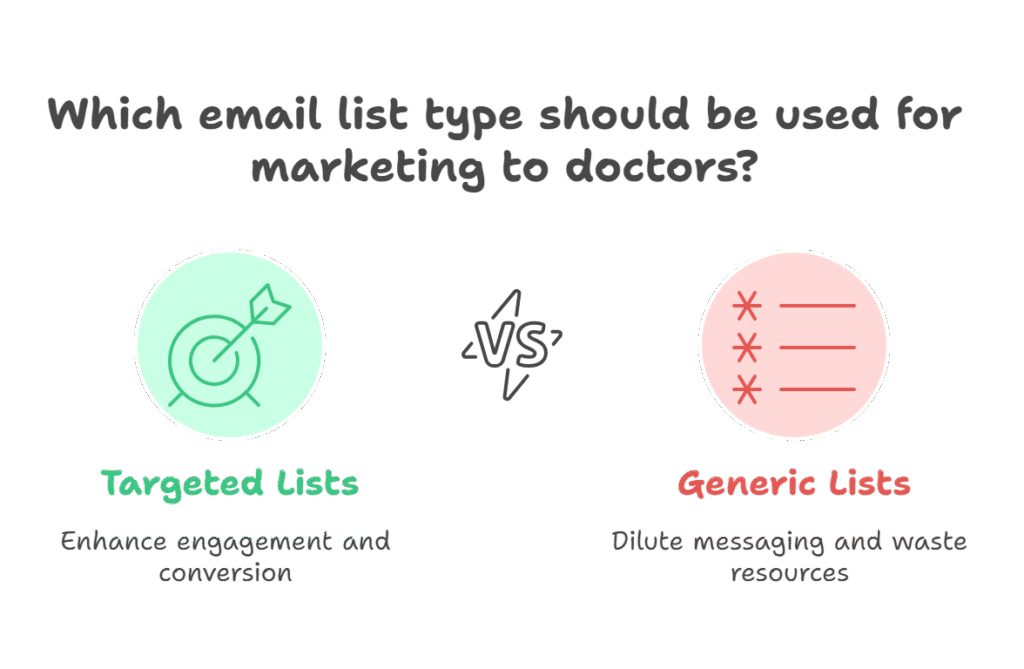
7 Reasons Why Targeted Doctor Email Lists Beat Generic Approaches Every Time
Are your healthcare email campaigns falling flat? You’re not alone if you’re relying on generic lists. In the fast-paced and highly specialized world of healthcare, reaching the right audience with the right message is paramount.
Yet, many marketing and sales professionals continue to employ broad, untargeted email strategies, hoping for a breakthrough that rarely materializes. Healthcare professionals are time-poor, bombarded with information from countless sources, and demand content that is immediately relevant to their practice and interests.

In the competitive landscape of healthcare, relying on generic email lists is a recipe for wasted resources and missed opportunities. This article will reveal seven compelling reasons why targeted doctor email lists consistently outperform generic approaches, leading to higher engagement, better ROI, and ultimately, greater success for your healthcare marketing initiatives.
The Problem with Generic Approaches
Before diving into the benefits of precision, it’s crucial to understand the pitfalls of a scattergun approach.
A. Low Engagement & Irrelevance
Sending emails to a broad, undifferentiated audience in the healthcare sector is akin to shouting into a void. Recipients are overwhelmed by irrelevant content, leading to abysmal open rates and click-through rates (CTRs).
For instance, while a generic email campaign might see an average open rate of 15-20%, a highly targeted campaign can easily achieve 30-40% or even higher, simply because the content directly addresses the recipient’s professional needs.
This lack of relevance also drives up unsubscribe rates, eroding your list over time and signaling to email service providers (ISPs) that your content isn’t valuable, further impacting deliverability.
B. Wasted Resources
Every email sent to an uninterested recipient is a wasted resource. This isn’t just about the direct cost of email marketing platforms; it’s about the invaluable time and effort spent crafting messages, designing campaigns, and analyzing metrics for an audience that was never going to convert.
When your team is sifting through low-quality leads generated from generic lists, they’re diverting attention from genuinely promising opportunities, squandering your marketing budget and inhibiting efficient use of marketing automation tools.
7 Reasons Why Targeted Doctor Email Lists Win Every Time
The solution lies in precision. Here are seven compelling reasons why targeted doctor email lists are the undisputed champion in healthcare email marketing.
Reason 1: Hyper-Personalization and Relevance
The most significant advantage of physician email lists is the ability to personalize your message. When you know a doctor’s specialization, geographic location, practice size, or even their specific interests (e.g., new research in cardiology, advancements in surgical robotics), you can tailor your content precisely.
Imagine sending an email about a groundbreaking new surgical tool only to orthopedic surgeons, rather than to a general medical list that includes pediatricians and dermatologists. This level of personalization means your emails resonate deeply, addressing specific pain points or professional interests, which in turn significantly boosts engagement metrics.
Reason 2: Significantly Higher Open and Click-Through Rates
It’s simple: highly relevant content gets opened and clicked. When an email’s subject line and preview text clearly indicate that the content inside is pertinent to a recipient’s medical practice or area of expertise, they are far more likely to engage.
Industry trends consistently show that email list segmentation leads to dramatically improved open and click-through rates. While generic campaigns might struggle to hit a 15% open rate, targeted doctor email lists can often achieve 35% open rates and 5-10% CTRs, translating directly into more eyes on your message and more traffic to your landing pages.
Reason 3: Improved Lead Quality and Conversion Rates
Higher engagement isn’t just about vanity metrics; it translates directly to better lead quality. When a healthcare professional clicks on a targeted email, they are already demonstrating a genuine interest in your product or service.
This pre-qualification means your sales team receives warmer leads, reducing their prospecting time and increasing their conversion rates. Focusing on the quality of leads generated through healthcare professional engagement ensures that your sales efforts are directed towards those most likely to become customers.
Reason 4: Enhanced Sender Reputation and Deliverability
Email service providers (ISPs) monitor engagement metrics closely. High open rates, low bounce rates, and minimal spam complaints signal to ISPs that your emails are valued by recipients. Conversely, generic lists often lead to high bounce rates, low engagement, and increased spam complaints, which can damage your sender reputation and lead to your emails being flagged as spam or even blacklisted.
By using targeted doctor email lists, you foster a positive sender reputation, ensuring your messages consistently land in the inbox, not the junk folder.
Reason 5: Optimized Marketing Spend and ROI
Every dollar spent on marketing should deliver a return. Generic email campaigns often result in a significant portion of your budget being wasted on irrelevant audiences. Targeted doctor email lists ensure that your marketing spend is allocated efficiently, reaching only those individuals who are most likely to be interested in your offerings.
This precision leads to a higher ROI in healthcare marketing. For example, if a targeted campaign costs 20% more to acquire a highly segmented list but yields a 50% higher conversion rate, the overall cost per acquisition dramatically decreases, leading to a much better return on investment.
Reason 6: Better Compliance with Healthcare Regulations
The healthcare industry is heavily regulated, with strict rules around data privacy and communication, such as HIPAA in the US and GDPR in Europe. Utilizing targeted doctor email lists from reputable providers can significantly aid in compliance.
These lists are often curated with consent and data accuracy in mind, reducing the risk of violating privacy regulations. By ensuring your communications are relevant and desired by the recipient, you also reduce the likelihood of complaints that could lead to regulatory scrutiny, making your medical marketing efforts safer and more ethical.
Reason 7: Actionable Analytics and Continuous Optimization
With targeted lists, your analytics become far more insightful. Instead of a broad overview, you can gain granular insights into what resonates with specific segments of healthcare professionals. This data-driven marketing approach allows for precise A/B testing within segments, identifying the most effective subject lines, call-to-actions, and content formats for different specialties or demographics.
These actionable analytics empower you to continuously optimize your campaigns, refining your strategy for even greater success in future healthcare email marketing endeavors.
Implementing a Targeted Approach
Transitioning to a targeted approach requires strategic planning but yields immense rewards.
A. Key Steps to Building and Utilizing Targeted Lists:
- Data Collection and Enrichment: Start by identifying your ideal customer profiles within the healthcare sector. This involves understanding their specialties, practice sizes, geographical locations, and professional interests.
- Segmentation Strategies: Once data is collected, segment your list based on these criteria. Common segments include cardiologists, oncologists, general practitioners, hospital administrators, or even by specific medical conditions they treat.
- Content Creation Tailored to Segments: Develop highly specific content for each segment. A white paper on new diabetes management technologies will resonate with endocrinologists, while information on advanced imaging equipment will appeal to radiologists.
B. Overcoming Challenges:
While the benefits are clear, challenges like ensuring data accuracy and maintaining compliance are crucial. Partnering with a reputable data provider that specializes in physician email lists and adheres to strict data privacy standards can mitigate these risks, providing you with clean, compliant, and highly effective lists.
Conclusion
The era of generic email blasts in healthcare marketing is rapidly fading. The unique demands and regulatory landscape of the medical field necessitate a more precise, thoughtful approach. As we’ve seen, targeted doctor email lists offer unparalleled advantages, from achieving hyper-personalization and boosting engagement to optimizing your marketing spend and ensuring regulatory compliance.
They are the cornerstone of effective healthcare professional engagement and the key to unlocking significant ROI in healthcare marketing.
It’s time to move beyond generic email blasts. Take the first step towards transforming your healthcare marketing by investing in high-quality, targeted doctor email lists. Contact a reputable data provider today to explore how precise segmentation can unlock the full potential of your campaigns and drive measurable success.